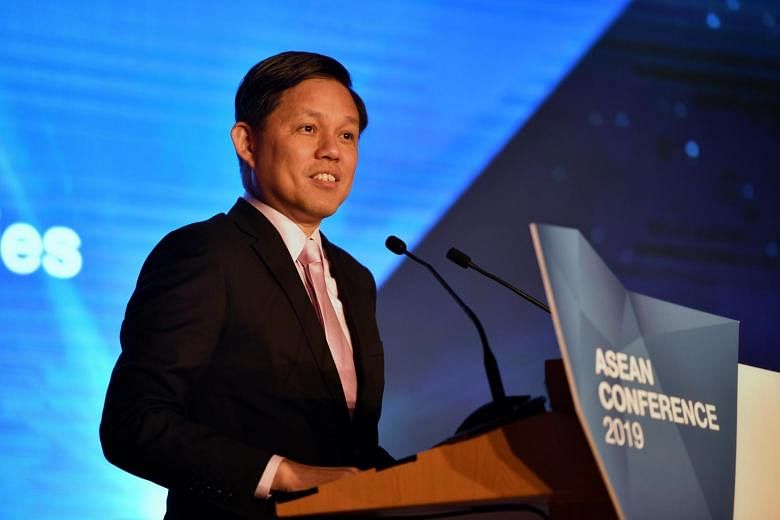SINGAPORE - As the US and China grapple with their long-term challenges and trade tensions, Asean should continue to forge partnerships, work together to build common platforms and grasp new opportunities in the digital space, Trade and Industry Minister Chan Chun Sing said on Tuesday (June 4).
Asked by Singapore Business Federation (SBF) chief executive Ho Meng Kit about the longer-term outcome of the US-China dispute and how Asean should respond, Mr Chan said the regional grouping should continue to ensure there is an open and transparent set of rules enabling all countries to work together.
Speaking at the Asean Conference at the Ritz-Carlton hotel, he said countries also need to come together to seize opportunities that the new digital space offers, such as the flow of data across borders that allows companies to create new products and services.
"There are tremendous opportunities and we will have to resist the temptation to look at the new economy as if it is the old," he stressed.
The Asean Conference, attended by close to 500 people including business leaders from Singapore and Asean, is a platform to understand trends and developments in the region.
Asean countries should also work on common platforms and systems, such as payment systems and intellectual property protection, said Mr Chan.
On top of that, Asean must continue to remain an open platform and forge partnerships with as many countries and economic blocs as possible.
In that process, it can diversify its markets, supply chains and distribution networks to lower the risks the entire Asean economy faces.
It will take some time to see progress in US-China issues, said Mr Chan, adding that this is because the superpowers will have to resolve fundamental matters such as how they view each other.
"There is a lack of strategic trust, if you like, between the two, and that will take time to resolve," he said in response to Mr Ho in a dialogue.
If the United States and China are to deal with each other confidently, said Mr Chan, both parties must look at their long-term challenges.
For the US, this means focusing on how it can maintain its long-term competitiveness, which will be defined by factors such as its enterprise, innovation and people's skills.
For China, this involves mitigating the unequal pace of developments among its cities without risking the loss of political control.
In an opening address, Mr Chan highlighted three things businesses can do to prevent the global situation from deteriorating further, as the world finds itself at a crossroads and the international geopolitical and economic environment comes under strain.
One thing that businesses can do is to make a case to keep markets open and integrated, such as by helping to eliminate non-tariff barriers and making a strong call for the early conclusion of the Regional Comprehensive Economic Partnership this year.
With Asean being almost tariff-free, non-tariff barriers are now "key impediments" to further integration, said Mr Chan.
Protectionism has sparked the rise of such barriers even in Asean, and businesses can play a stronger advocacy role in nudging their respective host governments to streamline and eventually eliminate these, he added.
The second thing enterprises can do is to provide fresh ideas on emerging issues like digital integration, allowing the region to be connected by the same data and financial standards.
"In today's world, the non-tangible aspects of connectivity will be as important, if not more important than the physical aspects of connectivity," he said.
"But at the same time, there are forces around the world that threaten the further integration of the digital space. There is a real risk that if we don't get it right, the digital space will be Balkanised (fragmented)."
The third thing businesses can do is to help workers acquire new skills to remain relevant in a time of disruption. If workers are left behind with their salaries and wages regressing, then a backlash can be expected against trade, globalisation and technology.
Similarly, if businesses are unable to make the necessary adjustments to keep pace with the competition, there is every tendency that they may instead be lobbying for more protectionist measures to avert the changes that they so need, said Mr Chan.
At the event, UOB deputy chairman and chief executive Wee Ee Cheong also highlighted that new technologies allow industries to operate more efficiently and this will boost Asean's position as a global manufacturing hub.
SBF chairman Teo Siong Seng said that among SBF members keen on expanding overseas, close to 80 per cent are looking towards expansion in Asean, indicating the importance of the region.
To help companies' regional expansion, SBF will be launching new "market-focus business networks", starting with Vietnam, Indonesia, Thailand and Myanmar, with plans to extend them to all Asean countries, Mr Teo added.
SBF intends to get these first four groups up and running in the next 12 to 18 months.
The networks bring together enterprises and practitioners in the market to understand their needs, foster collaboration and establish connections with local government authorities.
SBF is also working with its overseas counterparts to build new bilateral platforms to strengthen cross-border business collaborations and identify new opportunities.
In the next year, it aims to launch bilateral councils with Myanmar, Thailand and Vietnam, said Mr Teo.


